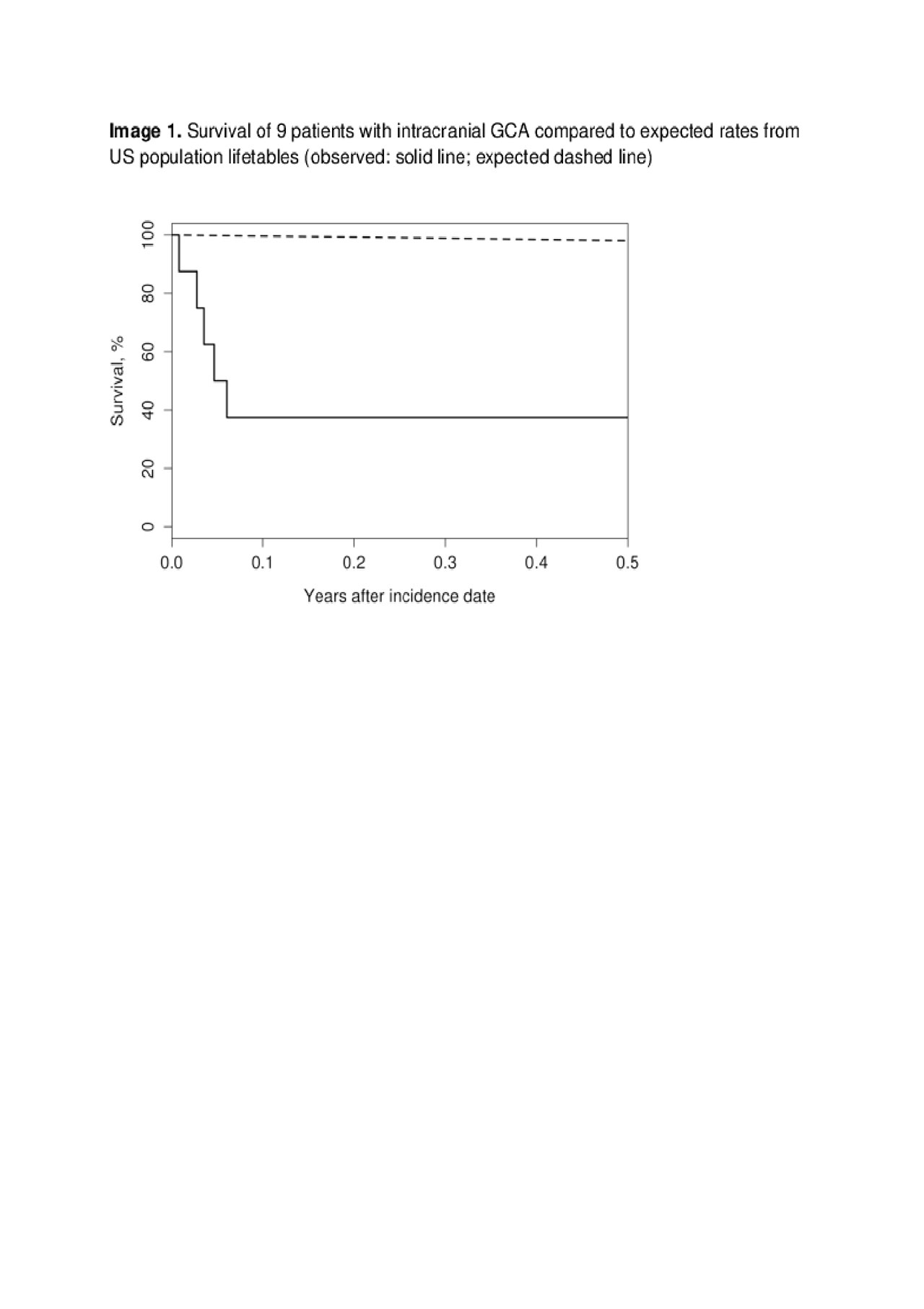Session Information
Date: Tuesday, November 12, 2019
Title: Vasculitis – Non-ANCA-Associated & Related Disorders Poster III: Giant Cell Arteritis
Session Type: Poster Session (Tuesday)
Session Time: 9:00AM-11:00AM
Background/Purpose: Giant cell arteritis (GCA) is a large vessel vasculitis that primarily affects the aorta and its branches. Extracranial branches of the carotid artery are frequently affected; however, intracranial involvement in GCA is rare.
To determine the clinical features and outcome of patients with intracranial giant cell arteritis (IC-GCA).
Methods: A retrospective medical record review was performed to identify all patients with IC-GCA from 1/1996 through 5/2018. Demographic, clinical, laboratory, radiographic, and treatment data at baseline and subsequent follow-up visits were collected. Data was summarized using descriptive statistics
Results: The study cohort included 9 patients with IC-GCA (78% male, mean [±SD] age 72.1 [±7.9] years). 8 of 9 patients had positive temporal artery biopsies. One patient with negative biopsy had evidence of large-vessel GCA on thoracic CT angiography. The mean time from onset of GCA to intracranial involvement was 17 months (±38). All patients had neurologic symptoms, 33% (n:3) had a stroke and 22% (n:2) had a transient ischemic attack. IC-GCA was diagnosed by cranial imaging in 8 patients and by autopsy in one. Cranial imaging modalities used included magnetic resonance angiography (n=8), CT angiography (n=2) and cerebral angiography (n=2). Intracranial vasculitis most commonly affected the internal carotid artery 78% (N=7) followed by the, vertebral artery 56% (n=5), posterior cerebral artery 56% (n=5), middle cerebral artery 44% (n=4), anterior cerebral artery 33% (n=3) and posterior inferior cerebral artery 11% (n=1). Stenosis was present in 89%, occlusion in 33%, dilatation in 11%, and wall thickening in 11%. All patients received glucocorticoids. For treatment of intracranial disease additional agents included: cyclophosphamide (67%), Tocilizumab (22 %). Despite treatment, outcomes for patients with IC-GCA were poor. Five of nine patients died during a mean length of follow-up of 2.4 months. Comparing IC-GCA patient survival to the expected rates from the U.S. population (Figure 1), the standardized mortality ratio (95% CI) for IC-GCA was 179.7 (58.3, 419.4); p< 0.001.
Conclusion: Although rare, IC-GCA is associated with significant morbidity and mortality. It occurs predominantly in men, presenting with ischemic cerebrovascular events. Current treatment strategies appear to be of limited efficacy for IC-GCA.
To cite this abstract in AMA style:
Sanchez-Alvarez C, Hawkins A, Koster M, Lehman V, Crowson C, Warrington K. Giant Cell Arteritis with Intracranial Vasculitis: A Case Series [abstract]. Arthritis Rheumatol. 2019; 71 (suppl 10). https://acrabstracts.org/abstract/giant-cell-arteritis-with-intracranial-vasculitis-a-case-series/. Accessed .« Back to 2019 ACR/ARP Annual Meeting
ACR Meeting Abstracts - https://acrabstracts.org/abstract/giant-cell-arteritis-with-intracranial-vasculitis-a-case-series/

